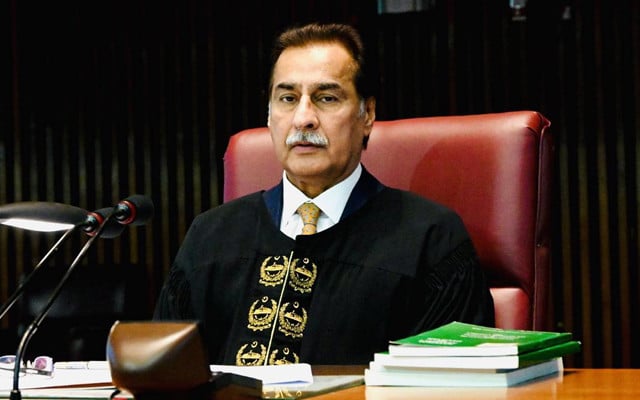
ISLAMABAD – The conflict between Pakistan’s parliament and the Supreme Court has intensified. National Assembly Speaker Sardar Ayaz Sadiq sent a strong letter to the Election Commission of Pakistan (ECP) on Thursday. The speaker urged the ECP to respect parliamentary sovereignty in allocating reserved seats to the Pakistan Tehreek-e-Insaf (PTI).
The Supreme Court had earlier ruled that independent candidates could join political parties after elections and change their allegiance. Eight judges directed the ECP to implement this decision swiftly. On July 12, the court declared PTI eligible for reserved seats that were initially given to other parties in the national and provincial assemblies.
In response, parliament passed the Elections (Second Amendment) Act, 2024, which imposes restrictions on party-switching by independent candidates. This law overrides the Supreme Court’s decision. The bill, introduced by PML-N MNA Bilal Azhar Kayani, prevents post-election party affiliation changes.
Read: Imran Khan Alleges Term Extensions, Bilawal Predicts Next Chief Justice
Speaker’s Letter Defends Parliament’s Authority
Through his letter, Speaker Ayaz Sadiq challenged the Supreme Court’s ruling, reinforcing parliament’s legislative authority. He emphasized that the newly passed law invalidates the court’s judgment. He pointed out that the Supreme Court ruling came before the law was enacted, making it outdated.
Sadiq stressed the importance of parliamentary sovereignty, stating that undermining this principle could damage public trust in democratic institutions. He argued that the ECP must apply the amended elections law when allocating the contested reserved seats.
Legal Provisions and Retrospective Effect
Sadiq cited sections of the amended law that make political party affiliation by independent candidates irrevocable. He highlighted that these provisions are retroactive, dating back to the 2017 Election Act. According to the speaker, this makes the Supreme Court’s July ruling inapplicable.
The letter also referenced Section 66 of the amended law, which requires candidates to declare their party affiliation before elections. Without this declaration, candidates are considered independent, and their affiliations cannot be altered after the elections.
Political Implications of Reserved Seats
The allocation of reserved seats has significant political consequences. The ruling PML-N-led coalition is currently blocked from obtaining a two-thirds majority in the National Assembly. This limits their ability to pass key legislation, including constitutional amendments.
If the Supreme Court’s decision is implemented, PTI will gain control of the reserved seats. This could make PTI the largest party in the National Assembly, shifting the balance of power away from the government.
Broader Legal and Constitutional Conflict
The speaker’s letter highlights a broader conflict between the legislative and judicial branches of the government. Ayaz Sadiq argued that the amended election law supersedes the Supreme Court’s earlier judgment. He called on the ECP to honor parliament’s laws and uphold democratic principles.
This legal dispute sets the stage for a potential showdown between the judiciary and parliament, with the ECP caught in the middle. The commission now faces the challenge of balancing parliamentary law with judicial orders.
ECP’s Dilemma
The ECP must now decide whether to follow parliament’s amended law or the Supreme Court’s ruling. If the ECP sides with parliament, the ruling coalition could regain its political advantage. On the other hand, if the court’s decision is upheld, PTI will gain key seats, delivering a blow to the government.
The unresolved dispute over reserved seats continues to add complexity to Pakistan’s political landscape, leaving the future balance of power uncertain.
Follow us on Google News, Instagram, YouTube, Facebook, Whats App, and TikTok for latest updates.




